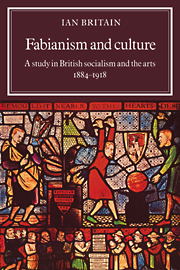Book contents
- Frontmatter
- Contents
- Preface
- List of abbreviations
- Introduction
- PART I THE LITERARY AND ARTISTIC ORIGINS OF FABIAN SOCIALISM
- 1 Thomas Davidson, the New Life Fellowship and the earliest Fabians
- 2 The young Webbs: towards a socialist partnership
- 3 Three Fabian essayists and William Morris
- 4 Bernard Shaw
- PART II ART, AUSTERITY AND PLEASURE IN FABIAN SOCIALISM
- PART III FABIANISM, ÉLITISM AND POPULAR CULTURE
- Conclusion
- Notes
- Bibliography
- Index
- Frontmatter
- Contents
- Preface
- List of abbreviations
- Introduction
- PART I THE LITERARY AND ARTISTIC ORIGINS OF FABIAN SOCIALISM
- 1 Thomas Davidson, the New Life Fellowship and the earliest Fabians
- 2 The young Webbs: towards a socialist partnership
- 3 Three Fabian essayists and William Morris
- 4 Bernard Shaw
- PART II ART, AUSTERITY AND PLEASURE IN FABIAN SOCIALISM
- PART III FABIANISM, ÉLITISM AND POPULAR CULTURE
- Conclusion
- Notes
- Bibliography
- Index
Summary
As editor of the Fabian Essays, and the author of two out of the seven contributions included, Shaw might have been expected to bear the brunt of William Morris's criticisms of that book; in fact, Morris was hardly critical of Shaw at all, and proclaimed his sympathies with the latter at least as loudly, and almost as unequivocally, as he did in dealing with Hubert Bland's essay. Shaw, Morris claimed, had ‘one of the clearest heads and best pens that Socialism has got’, using both of these assets to produce a devastating criticism of the ‘modern capitalistic muddle’. The only thing which Morris singled out as detracting from Shaw's items in the Fabian Essays was their attachment to the ‘Sidney Webbian permeation tactic’. If Shaw could only rid himself of that remnant of ‘opportunism’, to which he clung reluctantly enough as it was, his trenchant style and ‘reserves of indignation and righteous scorn’ could not only play a great destructive role, but also a more positive, inspirational one for all of his colleagues in the socialist movement.
Besides the appealing style and tone, there was much in the substance of Shaw's arguments — especially with respect to artistic and cultural questions — to command Morris's sympathy. These questions were related to social and economic matters in a way that recalled some of Morris's own basic arguments.
- Type
- Chapter
- Information
- Fabianism and CultureA Study in British Socialism and the Arts c1884–1918, pp. 96 - 110Publisher: Cambridge University PressPrint publication year: 1982

